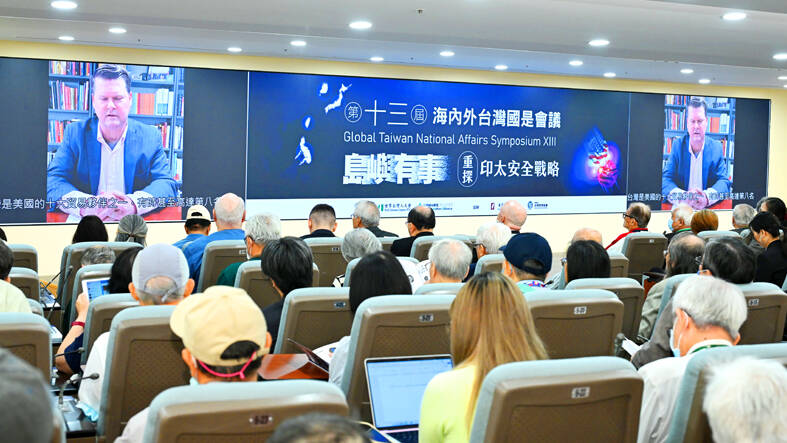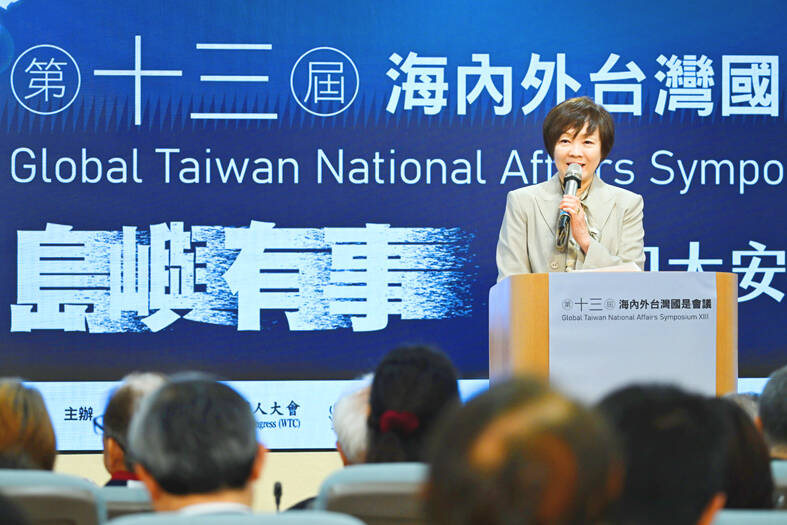Washington has reasons to consider Taiwan a critical partner and would likely continue its commitments to Indo-Pacific allies and partners, former US assistant secretary of defense for Indo-Pacific security affairs Randall Schriver told the Global Taiwan National Affairs Symposium XIII in Taipei yesterday.
Speaking via a prerecorded video, Schriver said Taiwan is one of the US’ critical partners, as it not only plays a key role in the semiconductor sector, but is also the eighth-biggest trading partner and the sixth-largest agricultural product export market to the US.
Taiwan is also the second-largest buyer of US arms, he said, adding that the two countries’ ties are built on common values and interests.

Photo: Chen Yi-kuan, Taipei Times
Given that Taiwan is at the center of the Indo-Pacific region, it is indispensable to countries upholding the free and open Indo-Pacific order such as the US, Japan and the Philippines, he said.
It is understandable that people doubt that US commitments to Indo-Pacific partners would continue or they question whether such partnerships are valued by US President Donald Trump, he said.
Schriver said he would be cautiously optimistic about the situation, considering recent developments.

Photo: Chen Yi-kuan, Taipei Times
Officials of the US departments of defense and state expressed support for the US-Japan-Philippines cooperation and the reinforcement of the Quadrilateral Security Dialogue, he said.
They also visited the Indo-Pacific region and the US Indo-Pacific Command, he said.
These moves demonstrated the US’ continued investments in its Indo-Pacific allies and regional security, he added.
Schriver expressed concern over Washington’s cuts in foreign aid and the suspension of funding for the US Department of State’s overseas scholarships and exchange programs such as the Fulbright program.
Such soft-power tools should be resumed, as they are important in countering China’s psychological warfare in the Indo-Pacific region, he said.
Taiwan should also take more responsibilities, he said.
The nation should strengthen its self-defense capabilities and develop infrastructure resilience — especially in telecommunications and energy, Schriver said.
Taiwan should also try to lessen its trade surplus with the US by increasing its investments there to stabilize bilateral ties, he said.
Taiwan should also continue protecting submarine communications cables, addressing climate change and assisting infrastructure developments of Pacific island countries, he said.
The US’ goal is to buy more time by maintaining deterrence in the Indo-Pacific region, prompting China to reconsider its Taiwan policy, he said.
Taiwan’s future should be decided by Taiwanese, he said.
Meanwhile, Akie Abe, the widow of former Japanese prime minister Shinzo Abe, told the symposium that her late husband “loved Japan, loved Taiwan, and was one of the people most keen for regional peace.”
“My husband once said that ‘a Taiwan emergency is a Japan emergency,’ which I would understand as ‘peace in Taiwan is peace in Japan,’” she said.
Shinzo Abe admired Taiwanese values he learned from former president Lee Teng-hui (李登輝), she said.
She said while some lamented Shinzo Abe’s and Lee’s passing as “the loss of two engines driving the Japan-Taiwan relationship,” she thought differently.
Akie Abe said she is close with Lee’s daughter, Annie Lee (李安妮), who is also the chairwoman of the Lee Teng-hui Foundation, and together they would continue Shinzo Abe and Lee Teng-hui’s efforts to deepen bilateral ties.
The symposium was co-organized by the World Taiwanese Congress and the Taiwan Nation Alliance, and focused on issues relating to Indo-Pacific security strategies and the trilateral security cooperation between Taiwan, the US and Japan.

The manufacture of the remaining 28 M1A2T Abrams tanks Taiwan purchased from the US has recently been completed, and they are expected to be delivered within the next one to two months, a source said yesterday. The Ministry of National Defense is arranging cargo ships to transport the tanks to Taiwan as soon as possible, said the source, who is familiar with the matter. The estimated arrival time ranges from late this month to early next month, the source said. The 28 Abrams tanks make up the third and final batch of a total of 108 tanks, valued at about NT$40.5 billion

Two Taiwanese prosecutors were questioned by Chinese security personnel at their hotel during a trip to China’s Henan Province this month, the Mainland Affairs Council (MAC) said yesterday. The officers had personal information on the prosecutors, including “when they were assigned to their posts, their work locations and job titles,” MAC Deputy Minister and spokesman Liang Wen-chieh (梁文傑) said. On top of asking about their agencies and positions, the officers also questioned the prosecutors about the Cross-Strait Joint Crime-Fighting and Judicial Mutual Assistance Agreement, a pact that serves as the framework for Taiwan-China cooperation on combating crime and providing judicial assistance, Liang

A group from the Taiwanese Designers in Australia association yesterday represented Taiwan at the Midsumma Pride March in Melbourne. The march, held in the St. Kilda suburb, is the city’s largest LGBTQIA+ parade and the flagship event of the annual Midsumma Festival. It attracted more than 45,000 spectators who supported the 400 groups and 10,000 marchers that participated this year, the association said. Taiwanese Designers said they organized a team to march for Taiwan this year, joining politicians, government agencies, professionals and community organizations in showing support for LGBTQIA+ people and diverse communities. As the first country in Asia to legalize same-sex

MOTIVES QUESTIONED The PLA considers Xi’s policies toward Taiwan to be driven by personal considerations rather than military assessment, the Epoch Times reports Chinese President Xi Jinping’s (習近平) latest purge of the Chinese People’s Liberation Army (PLA) leadership might have been prompted by the military’s opposition to plans of invading Taiwan, the Epoch Times said. The Chinese military opposes waging war against Taiwan by a large consensus, putting it at odds with Xi’s vision, the Falun Gong-affiliated daily said in a report on Thursday, citing anonymous sources with insight into the PLA’s inner workings. The opposition is not the opinion of a few generals, but a widely shared view among the PLA cadre, the Epoch Times cited them as saying. “Chinese forces know full well that